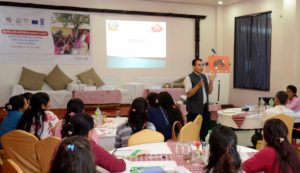A five-day workshop on developing capacities of Community Learning Centres (CLCs) on facilitation, management and civic education was organised in Bhaktapur from 5 – 9 August 2019. The participants of the workshop included members of 22 CLCs from Bhaktapur municipality.
The CLC is a community-based non-formal educational institution that provides a range of services and learning opportunities to out-of-school children, youth and illiterate or semi-literate adults from socially disadvantaged rural and urban communities.
This year, the UNDP Electoral Support Project (ESP) and UNESCO collaborated with support from the European Union to enhance the understanding of the CLC managers and facilitators on democratic governance and elections. The content, based on information published by the Election Commission, Nepal, encompassed voter education, civic education, management, election procedures, election cycles and legal provisions in regard to elections and people’s participation to support credible elections.
The inauguration session emphasized that CLCs, currently 2,152 in 51 districts, represent a sustainable way to reach the most isolated community members on various issues, including elections. The inauguration session was attended by Mr. Baburam Poudel, the Director General of the Centre for Education and Human Resource Development (CEHRD); Mr. Balaram Timilsina, Head of Education Department of UNESCO; and Mr. Kundan Das Shrestha, Senior Electoral Advisor of UNDP ESP. They all emphasized the crucial role played by the CLC in capacitating communities on civic and voter education and supporting inclusive and fair elections by ensuring community participation.
The workshop included a total of 28 participants out of which 75% were female. Among the participants of the workshop, 68% strongly agreed that their knowledge on democracy and elections was enhanced because of the workshop. The participants were all committed to enhancing the capacities of their communities on the issues that were addressed at the event. A participant shared that “the information [they] learned on elections and the role of CLCs will be particularly pertinent during the by-elections, to ensure that no vote is invalid.” It proved to be effective in orienting the participants on issues like voter registration, inclusion, and electoral dispute resolution. Another participant, expressed, “I assure you on behalf of the CLCs here, that CLCs will fully commit to providing support to elections in taking them to the community level, if we are entrusted with this important task.”
The Electoral Support Project- Phase II (ESP) is a technical assistance initiative which focuses on a long-term institutional and professional capacity development of the Election Commission (ECN) for conducting credible, inclusive and transparent elections. The objectives of the project are 1) to strengthen the capacity of the ECN to function as an independent and credible institution, 2) to allow the conduct of the election cycle in an effective, sustainable, and credible manner, and 3) to increase democratic participation, particularly for under-represented and disadvantaged segments of the Nepali society. ESP is currently funded by EU.

